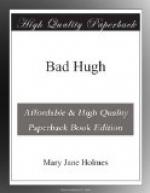“One, two three—yes, as good as four women and a child,” he began, “to say nothing of the negroes, and that is not the worst of it; the hardest of all is the having people call me stingy, and the knowing that this opinion of me is encouraged and kept alive by the remarks and insinuations of my own sister,” and in the red gleam of the firelight the bearded chin quivered for a moment as Hugh thought how unjust ’Lina was to him, and how hard was the lot imposed upon him.
Then shifting the position of his feet, which had hitherto rested upon the hearth, to a more comfortable and suggestive one upon the mantel, Hugh tried to find a spot in which he could economize.
“I needn’t have a fire in my room nights,” he said, as a coal fell into the pan and thus reminded him of its existence, “and I won’t, either. It’s nonsense for a great hot-blooded clown, like me to be babied with a fire. I’ve no tags to braid, no false switches to comb out and hide, no paint to wash off, only a few buttons to undo, a shake or so, and I’m all right. So there’s one thing, the fire—quite an item, too, at the rate coal is selling. Then there’s coffee. I can do without that, I suppose, though it will be perfect torment to smell it, and Hannah makes such splendid coffee, too; but will is everything. Fire, coffee—I’m getting on famously. What else?”
“Tobacco,” something whispered, but Hugh answered promptly: “No, sir, I shan’t! I’ll sell my shirts, the new ones Aunt Eunice made, before I’ll give up my best friend. It’s all the comfort I have when I get a fit of the blues. Oh, you needn’t try to come it!” and Hugh shook his head defiantly at his unseen interlocutor, urging that ’twas a filthy practice at best, and productive of no good.
Horses was suggested again. “You have other horses than Bet,” and Hugh was conscious of a pang which wrung from him a groan, for his horses were his idols. The best-trained in the country, they occupied a large share of his affections, making up to him for the friendship he rarely sought in others, and parting with them would be like severing a right hand. It was too terrible to think about, and Hugh dismissed it as an alternative which might have to be considered another time. Then hope made her voice heard above the little blue imps tormenting him so sadly.
He should get along somehow. Something would turn up. Ad might marry and go away. What made her so different from his mother? He had loved her, and he thought of her now as she used to look when in her dainty white frocks, with the strings of coral he had bought with nuts picked on the New England hills.
He used to kiss those chubby arms—kiss the rosy cheeks, and the soft brown hair. But that hair had changed sadly since the days when its owner had first lisped his name, and called him “Ugh,” for the bands and braids coiled around ’Lina’s haughty head were black as midnight. Not less changed than ’Lina’s tresses was ’Lina herself, and Hugh, strong man that he was, had often felt like crying for the little baby sister, so lost and dead to him in her young womanhood. What had changed Ad so?




